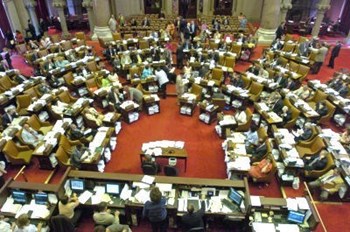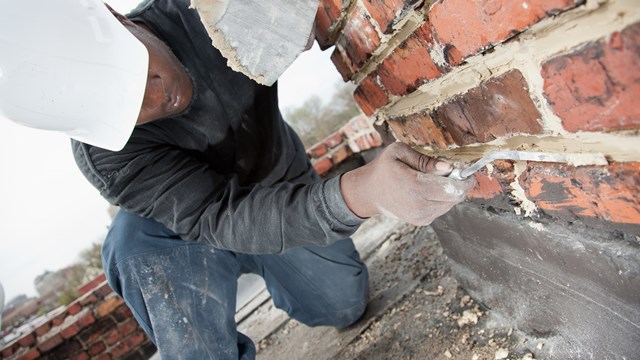
Legislatures are in session, both in the city and in Albany, and, as always, housing is a hot issue. What bills should co-op and condo board members, managers and owners be looking at that may impact their residences?
While there are basic laws that govern condos and co-ops—statewide, condominiums fall under the New York State Condominium Act and cooperatives fall under the Business Corporation Law—new issues come up all the time, necessitating new laws and initiatives on both the state and local levels.
The great majority of housing-related bills don't directly affect condo, co-op and HOA residents, but do cover a wide range of topics, from requirements for housing court clerks to Mitchell-Lama (federally-controlled rentals and co-ops) rental tenants to pets in housing projects. Some of the bills are specific to one municipality, such as one that "creates the central Buffalo housing development corporation."
Legislation Under Consideration
Often, the same bills, with some modification, are introduced year after year, proving the old saying, "If at first you don't succeed, try, try again."
Among the bills in Albany that relate to New York City condo and co-op residents is A00475 (O'Donnell-Clark, referred to Housing Committee) which would establish a licensing procedure for building managers of multiple dwellings in New York City and would require them to take a class. A01000 (Grannis-Pretlow, referred to Governmental Operations), which has gotten a lot of attention in the media lately, would require cooperative housing corporations to provide a prospective purchaser with a written statement of reasons when denying his or her application.
Another co-op and condo-related bill is A04275 (Ramos-O'Donnell, referred to Ways and Means) which would authorize an income-tax deduction of money that goes toward the first-time purchase of a condo or co-op unit.
However, even though these bills are on the table, it doesn't mean a decision will be reached about them anytime soon. "Of the many, many bills introduced in Albany, only a small percentage work their way through the appropriate committee to be presented for a vote by the Legislature," says Mary Ann Rothman, executive director of the Council of New York Cooperatives & Condominiums (CNYC).
"The thing about Albany," says Marolyn Davenport, senior vice president of management for the Real Estate Board of New York (REBNY), "is that we don't really know at this time what the major issues are going to be. Albany does everything at the last minute."
"We do know that by the end of the year, Albany has to act on 421-a. It's clearly an issue for the development community," Davenport says. She was referring to a bill that would revamp the 421-a tax exemption, a 35-year-old tax break for developers, but would expand the areas where developers would commit to building at least 20 percent affordable housing to qualify for the incentives. It would also add an income cap for luxury housing developments seeking inclusion in the program.
Her organization is also watching several bills relating to Mitchell-Lama housing. Created in 1955, Mitchell-Lama is a program that provides affordable rental and cooperative housing to moderate- and middle-income families.
Rothman mentions several bills. One in the City Council that her organization wholeheartedly supports is Intro 550, introduced by Councilman Daniel Garodnick (D-Manhattan). Applying to cooperative and rental buildings alike, it would spread out compliance with Local Law 11, the 1998 law mandating inspections of building facades, over a five-year calendar.
CNYC also hopes to see a proposal from the city for tax reform, and studies each initiative whose purpose it is to further affordable housing, including bills to save Mitchell-Lama housing.
There is, however, one bill before the council that seems to have everyone worried. That bill is the "Fair and Prompt Disclosure Act," or Intro 119, the aforementioned measure that would require co-ops to provide a "specific reason" for rejection of any potential purchaser. It is the same measure as the A01000 bill in Albany, only this bill is at the City Council level.
The possibility of liability is one of the main reasons for concern. Although many of the bill's supporters complain of widespread discrimination in housing, its opponents point out that current laws already prohibit discrimination based on a range of characteristics, from race to sex to marital status to disability to service in the military.
Rothman says such a measure "undermines the long-established right of cooperatives to decide who will be part of their community. Ample protections exist already within city, state and federal law regarding discrimination."
Mona Shyman of the Federation of New York Housing Cooperatives and Condominiums (FNYHC) says, "We are active in opposing that bill. We're against it for many reasons."
"In the case of 119, our managing agents are very concerned," says Davenport. "It presents a lot of liability and difficulty for them. They have made their clients aware of the problem. Many people would not want to be on the board if you have the degree of liability."
Her own co-op board, she said, once put out a list of guidelines for evaluating applications. Then, she says, she realized that many perfectly fine apartment owners would not have been able to buy their units if these guidelines had been in force at the time.
Is Albany Keyed In to NYC?
Condominium and cooperative business may seem common knowledge in the boroughs, but are people outside of New York City, and their legislators, really clued in to the issues and problems facing residents here? As we all know, New York is fairly unique among the state's cities in its percentage of apartment dwellers.
"Certainly, cooperatives are a form of ownership basically unique to New York City," says Davenport. "Condos are everywhere. The question in my mind is, are there condo conversions everywhere?"
Many of the controversial issues involving condos, she says, concern conversions from other forms of housing (or sometimes from warehouses or factories) to condos, rather than new construction.
Rothman of CNYC believes that because condos are springing out throughout the state, "this helps us get support from legislators from other parts of the state."
Also, she says, when legislation that only affects New York City is submitted in Albany, usually at the request of the mayor and/or City Council, "Other legislators support it as a courtesy to their colleagues in New York City."
In Albany, the chair of the Housing Committee in the state Assembly is Brooklyn Democrat Vito Lopez. In the Senate, the head of the Housing, Construction and Community Development Committee is John Bonacic, a Republican who represents Sullivan, Delaware and Ulster counties.
Spotlight on the City Council
If one checks the City Council's website, one sees that most of the housing-related bills and resolutions deal with one particular location, for example, a resolution approving an urban development action grant for an area only encompassing several city blocks. Still, some do deal with wider issues.
Anthony Hogrebe, a City Council spokesman, mentions four housing-related initiatives that the Council has been focusing on as of this writing.
Three of them apply strictly to rental tenants: The Renters' Tax Credit, which would provide a $300 tax cut to tenants who face the ever-increasing pressure of rising rents; the Renters-to-Owners Opportunity Fund, which would create a new down payment and closing-cost assistance to middle-class families who wish to purchase a home; and strengthening existing tenant harassment laws.
The fourth, the Better Buildings Bill, is also geared toward renters, but could have ramifications for co-op and condo buildings. It would require landlords to "respond to maintenance complaints with more than just patchwork solutions." For example, if a leaky faucet is the result of a larger plumbing issue, this legislation will require landlords "to address the underlying problem."
In the City Council, the head of the Housing and Buildings Committee is Erik Martin Dilan, another Brooklyn Democrat. There are 11 committee members, nine Democrats, two Republicans. One of the two Republicans, Staten Island's James Oddo, also chairs the Council's Task Force on Operations and Improvements of the Department of Buildings, a related body.
The Role of Interest Groups
Elected officials, whether state or city, are not the only ones who influence housing policy. There are also interest groups. In the co-op and condo field, and the wider housing field, three of the major players are the aforementioned REBNY, CNYC and FNYHC.
"These organizations," says Hogrebe, "represent a broad spectrum of New Yorkers in the housing industry, and sometimes advise council members of the potential effect that legislation might have on the real estate market, rent levels and other economic factors."
Representatives of these particular groups basically see their roles the same way—as an integral part of the democratic process.
"Our organizations try to keep track of bills that appear to be moving forward; we share with lawmakers our opinions, negative or positive, on these bills. On some occasions," says Rothman, "we ask our members to send letters or to make calls, either to support a promising measure or to defeat one that we feel would be harmful."
"A lot of times," says Davenport, "our work is making sure [legislators] understand the full consequences of a particular bill. A lot of times, legislation will sound good on paper, but will have a lot of consequences that are not readily apparent."
Shyman, of FNYHC, calls her group an "activist organization."
"We give our opinion on different bills, we go and speak to representatives," she says.
With all of the local, state and federal bills in consideration, one thing is for sure. All three organizations, owners, managers and board members will continue to closely monitor court decisions and legislation affecting co-ops and condos.
Raanan Geberer is a freelance writer based in New York City and a frequent contributor to The Cooperator.






2 Comments
Leave a Comment